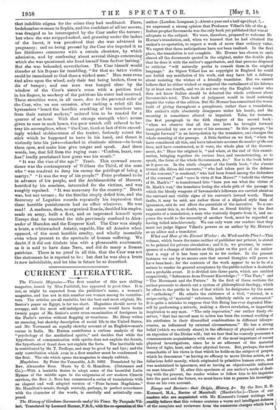What and How of the Eternal Worker : the Work
and the Plan Y—This volume, which bears the name neither of publisher nor printer, is stated to be printed for private circulation ; and it is, we presume, in conse- quence of a change of intention on this point on the part of its author that a copy of it has been sent to us for review. In the present instance we are by no means sure that second thoughts will prove to ha-e been best ; for the contents of the work appear to us to be of a nature to render its general acceptance by the public neither a desirable nor a probable event. It is divided into three parts, which are entitled respectively, "Inferences from Present Knowledge ; " "The Past;" and " The Movement and the Future." In the first of these sections the author proceeds to sketch out a system of philosophical theology, which he offers to the public in lieu of that which he designates by the name of "orthodoxy." He admits the existence of a God, "eternal, in a unique entity, of material' substance, infinitely subtle or attenuated." It is quite a mistake to suppose that this Being has ever degraded Him- self by performing a miracle, making a direct revelation, or imparting inspiration to any man. "The only inspiration," our author finely ob- serves, "that has moved man to action has been the normal working of his attributes in their diversified combinations in different idiosyn- crasies, as influenced by external circumstances." He has a strong belief (which we entirely share) in the efficiency of physical science as an expositor of the Divine will; but we fear that he scarcely possesses a commensurate acquaintance with some of the most important of recent physical investigations, since he is an adherent of the material theory of light, heat, and other physical forces. But, perhaps, the most remarkable of his views is that which he holds on the subject of prayer, which he denounces "as having no efficacy to move Divine action, as a fallacious habit merely, which originated in primitive human error, and was maintained in ignorance, and as having an objectionable influence on man himself." If, after this specimen of our author's mode of deal- ing with the present, the reader wishes to follow him in his inquiries into the past and the future, we must leave him to pursue his investiga- tions on his own account.






























 Previous page
Previous page